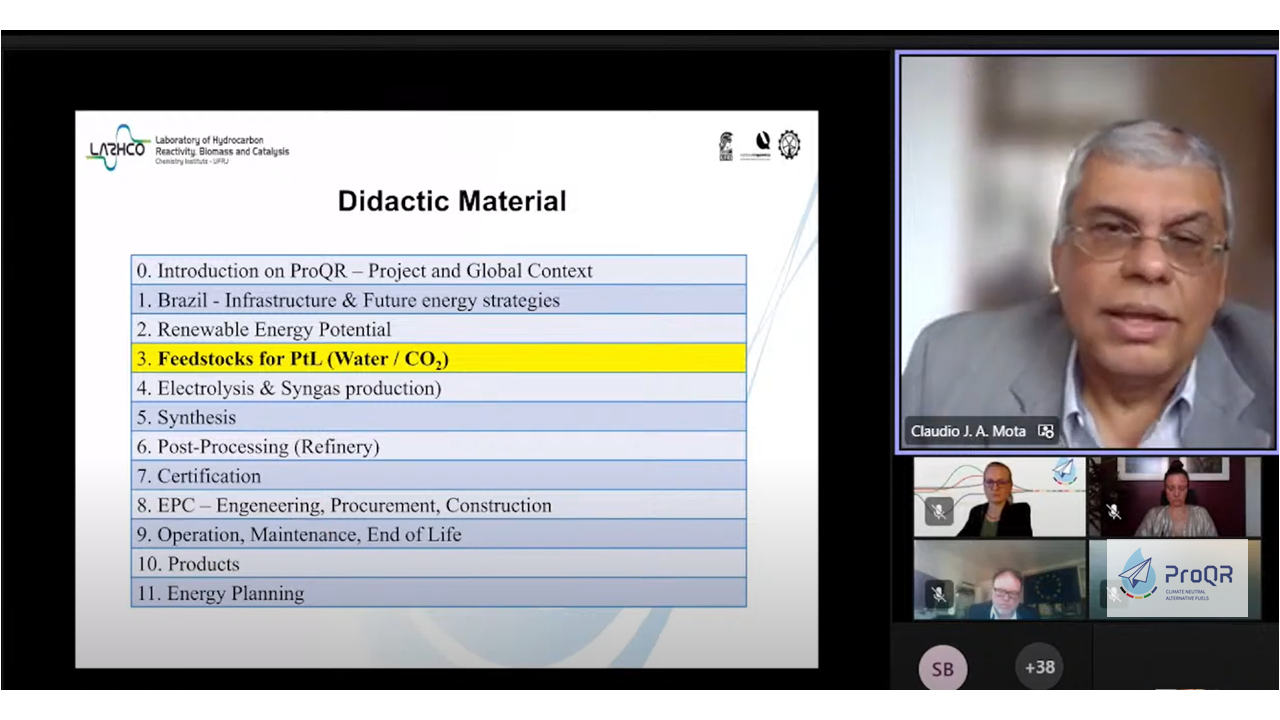ProQR webinar presents new teaching resource by DLR
Published on November 9, 2021
A key aspect of the ProQR project’s actions to promote Sustainable Aviation Fuels (SAF) in Brazil is its joint work with academia, which mobilizes a technological ecosystem composed of educational and research institutions from all over the country. Thus, ProQR seeks to promote research and education in sustainable fuels, in order to qualify professionals capable of building the future of decarbonisation in Brazilian aviation. A fundamental milestone in this educational initiative is the didactic material “Alternative Fuels for Aviation in Brazil”, developed in partnership with the German Aerospace Center (DLR, in German) and scheduled for release in December 2021.
Within this context, the webinar “Learning about Decarbonisation of Aviation – Higher Education for Sustainable Fuels” took place on the 27th of October 2021, which had as main goal to present and discuss this teaching material. The event was promoted in cooperation with the German Science and Innovation Centre (DWIH, in German) São Paulo. It was an opportunity to celebrate the recent formalisation of a closer partnership between GIZ Brazil and the DWIH São Paulo.
The ProQR project is implemented by Deutsche Gesellschaft für Internationale Zusammenarbeit (GIZ) GmbH for the German Cooperation for Sustainable Development in Brazil – in partnership with the Ministry of Science, Technology and Innovations (MCTI).
In the following, we present the summaries of the speakers’ presentations and offer the slide sets for download below:
Jürgen Kern (ProQR partner, senior researcher at DLR and co-author of the didactic material); Cláudio Mota (professor and director of the Institute of Chemistry at the Federal University of Rio de Janeiro, UFRJ, and reviewer of the didactic material); Amanda Gondim (coordinator of the Brazilian Network for Renewable Hydrocarbons and Biokerosene for Aviation, RBQAV, and researcher at the Federal University of Rio Grande do Norte, UFRN).
Production of the didactic material
Jürgen Kern (DLR) presented an overview of the main factors that drove the topic of sustainable fuels and culminated in the development of the didactic material, a partnership between ProQR and DLR. Since the Paris Agreement in 2015, the climate impact resulting from greenhouse gas emissions in aviation has become a highly relevant agenda. This is because, since these emissions occur in large quantities and at high altitudes, the decarbonisation of aviation becomes urgent. Among the various alternatives promoted internationally for this purpose, the development of alternative fuels is one of the most promising. The method of obtaining sustainable aviation fuels promoted by ProQR is Power to Liquid (PtL) which uses clean energy, hydrogen and carbon dioxide to chemically synthesise aviation fuel. Jürgen Kern also gave a preview of the eleven modules of the didactic material, which deal in depth with the steps of PtL and its applicability in Brazil.
Brazilian potential for PtL SAF
Professor Cláudio Mota (UFRJ) began his speech by commenting on the importance of chemistry in the evolution of energy matrixes throughout history. This protagonism is fundamental for the challenge imposed by the 21st century for the transition to a sustainable energy matrix. The professor emphasized the cooperation between UFRJ and ProQR in this mission, since the project seeks to solve the climate impacts of aviation without affecting humanity’s way of life in terms of air travel. The didactic material, according to Professor Mota’s speech, contributes in a positive way to transmit this complex theme to teachers, students and other partners from teaching and research institutions in Brazil, mainly for its ability to cover all relevant points of the subject in a synthetic way. As for the Brazilian particularities that influence the PtL processes, the professor highlighted the availability of renewable energy sources, the possibility of using biomass to produce synthesis gas, the variety of sources to obtain CO2 and the abundance of hydric resources.
Importance of sustainable fuel projects
Amanda Gondim (RBQAV) spoke about how the search for decarbonisation of aviation is an international demand that, in recent years, has gained increasing prominence in Brazil. In the United States and Europe, for example, where there are investments in the development of sustainable fuels since 2009, these are already a reality in airports. In the case of Brazil, the issue has received greater attention from the Brazilian government since 2017, with the emergence of RBQAV and ProQR, both supported by MCTI. For Amanda, the actions of the two projects were extremely important to boost the theme in Brazil and to make the production and use of sustainable aviation fuels a possible future. Amanda highlighted the work that RBQAV has been doing to provide technical knowledge during the process of creating government regulations for sustainable fuels. In this sense, she emphasizes the importance of the didactic material made by ProQR in partnership with DLR, since there are still few compilations on PtL SAF available in a didactic way in Brazil.
Workshop discusses and initiates access to teaching material
The new educational material “Alternative Fuels for Aviation in Brazil”, developed by DLR with the support of academics and sector specialists in Brazil, will be made available to interested academics, first, through participation in the next events: a virtual workshop in December and a face-to-face training scheduled for March 2022. As of now, ProQR invites to register for the Workshop:
Date: December 1, 2021, 9:00 am – 4:00 pm (Brasilia time)
Where: MS Teams Platform
Facilitation: DLR authors, ProQR team
Inscription: proqr@giz.de, subject: Workshop Didactic Material
Language: English, with translation offer for Portuguese
Webinar Speakers’ Presentations:
Jürgen Kern, DLR
Claudio Mota, UFRJ
Amanda Gondim, RBQAV/UFRN
Link to the recording of the event: Aprender sobre Descarbonização da Aviação (Webinário ProQR) – YouTube
(*Due to technical issues, unfortunately, the recording can be offered only in Portuguese.)
Contributor to this article is Ruth Barbosa.
